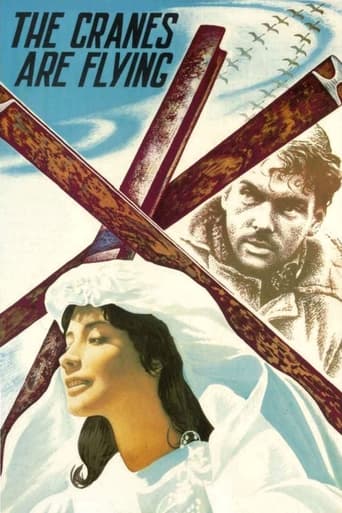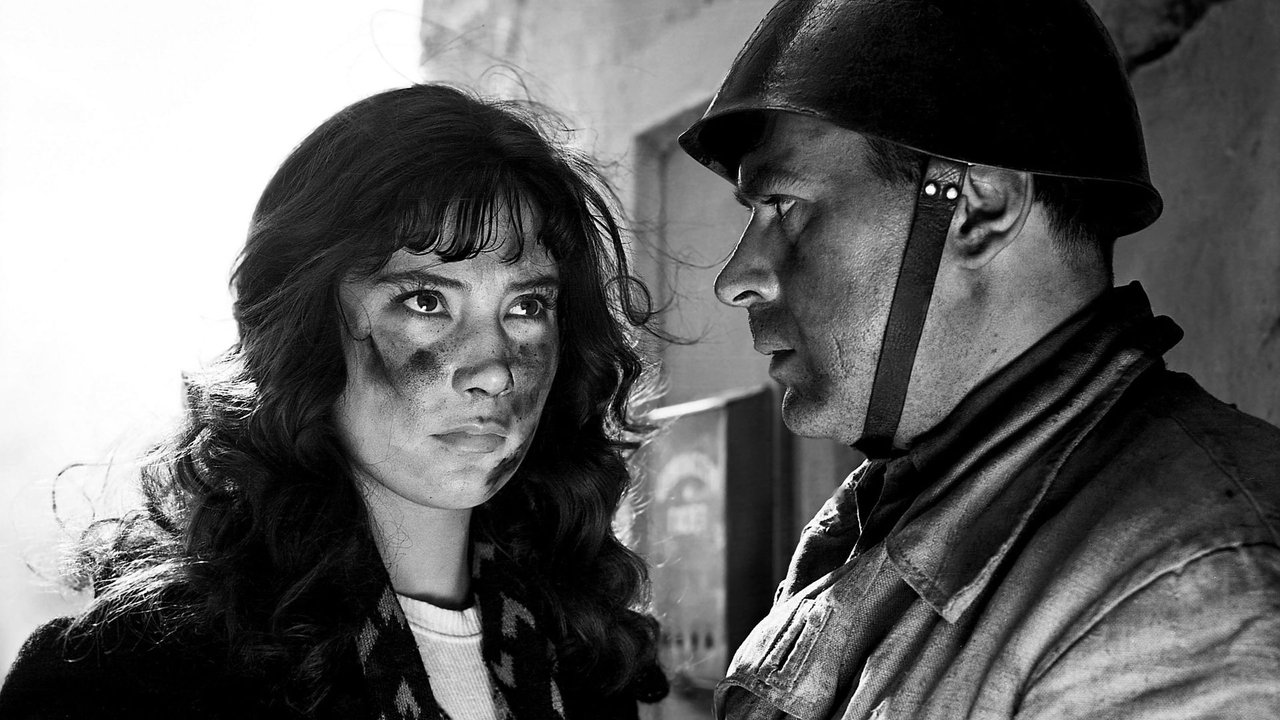Vonia
The Cranes Are Flying (Russian: Letyat zhuravli) (1957) Kind Veronika, Nicknamed "Squirrel" by her Boris, Before he departs, Gives her a stuffed squirrel and note. His last tragic love letter. Innocent young love, Cut short by the heartless war. Betrayal, rape, shame. Creative camera work Conveys war's calamity. (Tanka [短歌 tan-kah]) poems are short poems that are five lines long, with the 5-7-5-7-7 syllable format.
Kirpianuscus
more than a movie, it is a special experience. more than part of a period, it is a form of revelation. for extraordinaries images. for splendid shots. for the simple story. for drama. for the delicacy for present a profound tragedy. for the acting. to see The Cranes are flying is an event. for soul. and for the mind. a travel in time. and rediscover the basic values who defines each life. it is difficult to define it . because it is not only beautiful or seductive, touching or impressive. it is a honest testimony, a kind of window in the Soviet regime's gray reality. a film about love and about war. about innocence. and about survey. about the existence as drawing used the basic colors. see it ! for discover a new frame for your life. and new meanings for every day fights.
Kyle Salmons
Most definitely one of the best works of cinematography I have seen. Sergei Urusevsky is truly a cinematic genius. Many of the scenes in this film are shot with a hand-held camera, and the shots are incredible. Urusevsky conveyed the feelings and emotions of the characters through the camera, which is difficult for a lot of filmmakers to do. Not only is this a great film in terms of technique, but it is also a very beautiful story as well. The actors are great, the story is great, and just the film itself is great. I highly recommend this film to anyone; whether you are wanting to analyze it or just enjoy it. It is very beautiful and moving film; as well as a piece of cinematic art.
RResende
When you take your life as a film watcher seriously, you start deciding you own own special things you like to observe in films. That can be as simple as wanting to see films depicting certain themes (that's superficial to me), or observing how certain things are handled. In my case, and because i am, primarily, an architect, i care about how that is handled in film. It's not so much a matter of how the built world (architecture) is depicted, as i initially thought, but how the space is handled. It is not illustrative cinema what i look for, the kind of footage we have in most of the ordinary architecture documentaries. It's interpretations of space, ways to place us in those spaces, bended to the intentions of who films them. For that specific corner of film possibilities that i love, Kalatozov is one of the most interesting directors ever. He does handle space. In doing so he simultaneously works with framing, editing and, specially, camera movement (thus the cranes). I think he should be credited for these experiences along with the brilliant Urusevsky, two complementing and crazy visions. Their master work, definitely, is Soy Cuba, which has to be one of the most perfect visions of a lifetime work. That one is a perfect film in pretty much everything that you "see". This one, to me, paves the way to the later one, but what a powerful experience it is on its own.Check what we have here: - right at the beginning, the geometry of the composition that includes the stone from the stairs, the shadow of that stone, and the movement of the characters within that frame; - still at the beginning, the stairs scene. All the games that include editing, and those beautiful spiral camera moves up the stairs, and perfect framings of the stair pits. These stairs are a fundamental metaphor for the story, and they come back to our eyes, half destroyed, later on. From the point of view of the matching of space/architecture/camera, this is the most powerful moment in the film, that will stay long after i saw it; - all the sequences between crowds. These have a pretext, always the same, Veronika looking for Boris, early in the film she tries to find him so she can say goodbye, and at the very end, she still hopes to find him. This is powerful because it suffocates us, placing us as one among many. Those are strong spatial scenes which, still, depict very little built elements of the environment. It's about people and how we/camera and Veronika walk around or through it. This is the true nature of Kalatozov's eye. So powerful.Apart from these scenes which matter specially to me, we have two brilliant pieces of editing, which probably should be credited more to Urusevsky: -The implied rape scene where shadow/light, bomb sounds, and a piano score are the very definition of the drama we follow Veronika cross. Perfect editing, subtle camera work, perfect close up framing (Samoilova's face was precious); -Boris' death. To me it's less powerful than the other one, but still it works in ways that move you beyond surface.So, back to space concerns: we have geometric framing; we have camera movement and editing attached to an architectural space; and we have a disembodied spatial camera that moves without built references. What a visual glossary! What more can you want? This would be good enough, but Kalatozov/Urusevsky expanded our minds, and gave us Soy Cuba. What great lives they had.My opinion: 4/5 http://www.7eyes.wordpress.com


 AD
AD




